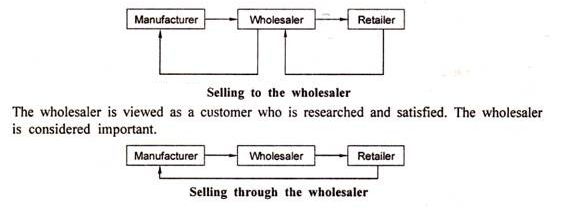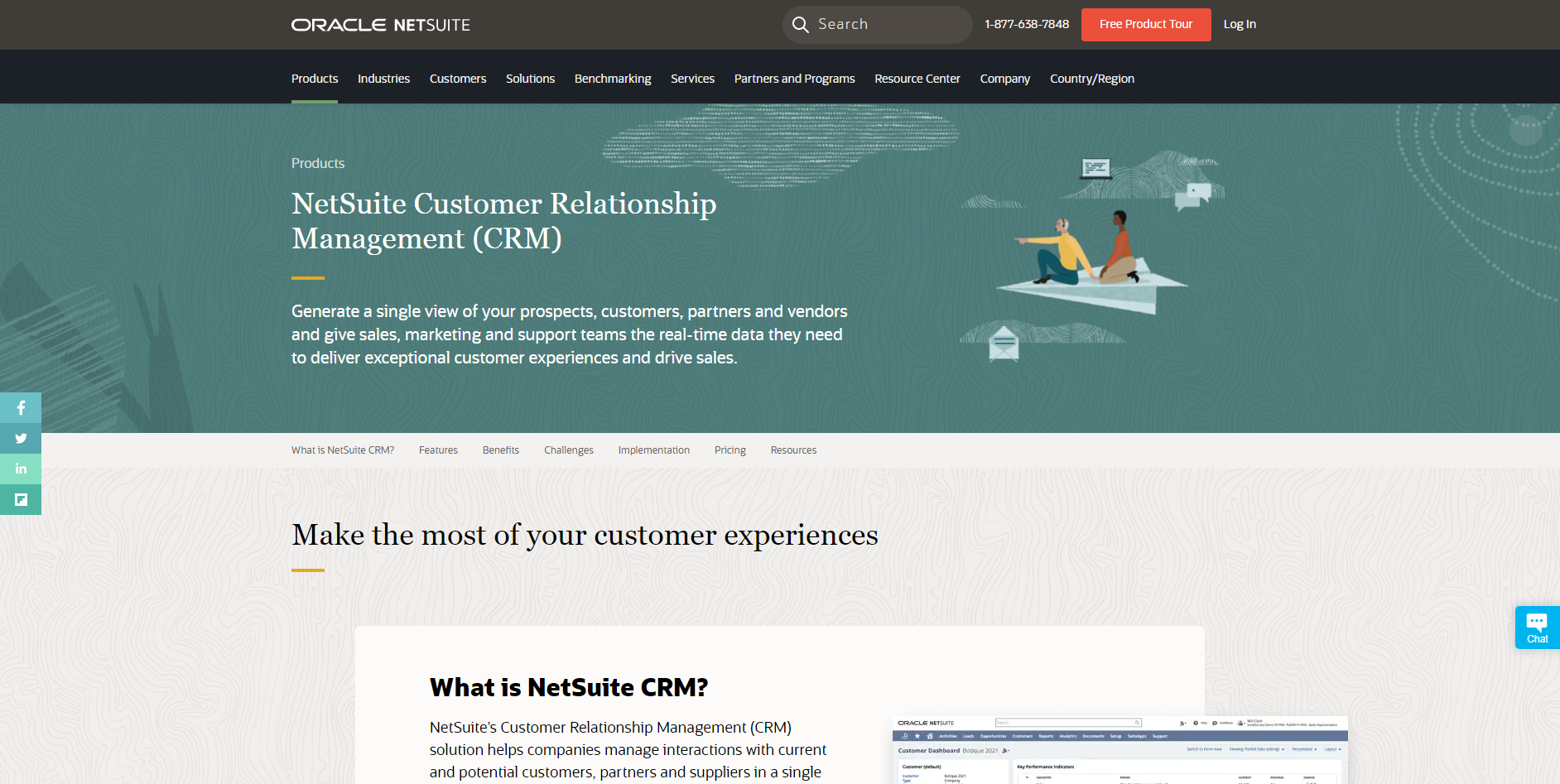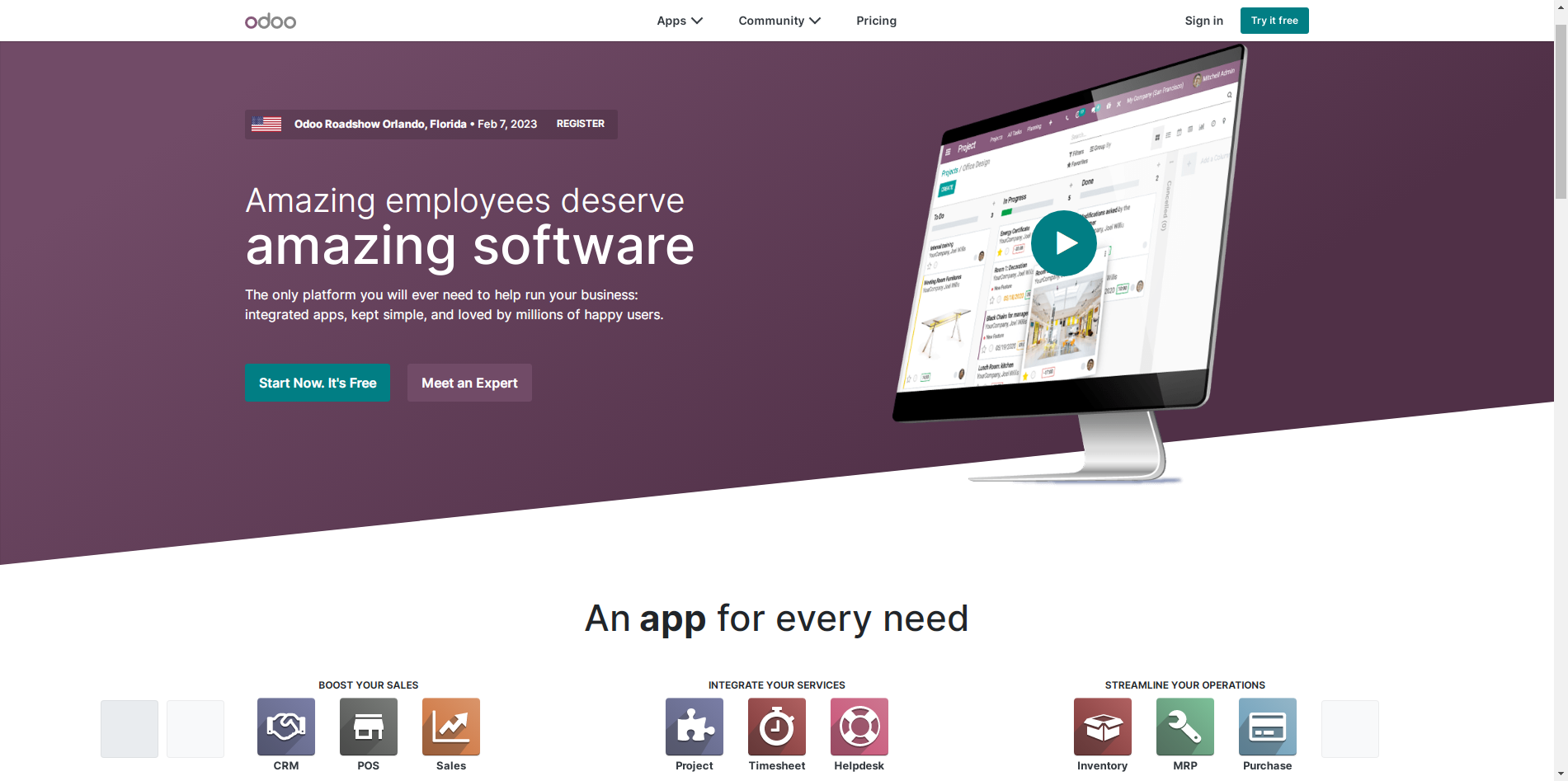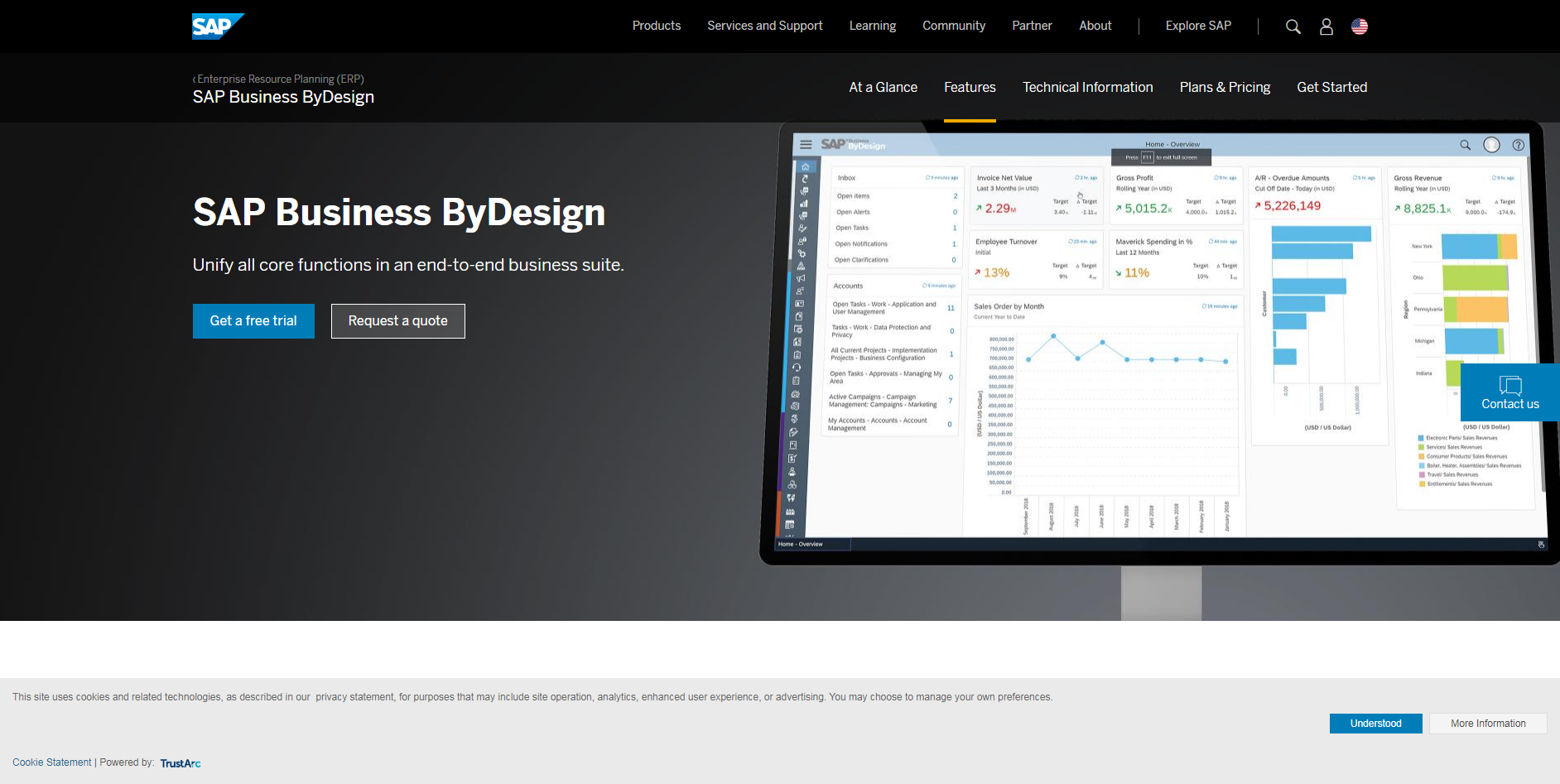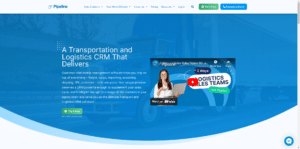Wholesaling is an 8.1 trillion dollar industry (up from 5.3 trillion in 2016).
According to the NAW, the wholesale industry “employs more than 6 million workers throughout the United States and accounts for 1/3 of the U.S. GDP. There are 35,000 wholesale distribution companies that operate in nearly 150,000 places of business across North America, including all 50 states.” So, if you’re a wholesaler, you’re a vital part of the economy.
While wholesalers hold our economy together, what’s holding their business together?
Today, we’ll look at the components of a successful wholesaler and the need for a CRM.
Why wholesalers need CRM software
Wholesalers deal with T-shaped complexity on a day-to-day basis.
You’re expected to manage relationships with manufacturers, distributors, retailers, and customers (indirectly). Each of these organizations may have its own set of goals that conflict with other organizations (i.e., retailers demanding a volume discount that goes against manufacturer purchasing guidelines). This balancing act is lateral.
As it is, you’re forced to work with other organization types to support your customers (retailers).
And then, to add to that complexity, you have to deal with a variety of vertical (internal) issues.
- Inventory management challenges.
- Product liability
- Assessing product profitability
- Property damage mitigation
- Cyclical or unexpected changes to supply and demand
- Keeping up with technology
- Maintaining customer satisfaction
- Customer management and support
However, CRM software helps you tie these lateral and vertical challenges together, ensuring a strong solution that grows with your business. It enables you to manage your lateral relationships with manufacturers, distributors, retailers, and customers, and address your vertical challenges (via integrations and APIs) using your existing tools.
But which one is best for your business, though? There are so many tools on the market with pros and cons for different budgets and needs. So, here’s a short list of the best CRM software for wholesalers and distributors.
Pipeline CRM is best for sales-driven wholesale teams
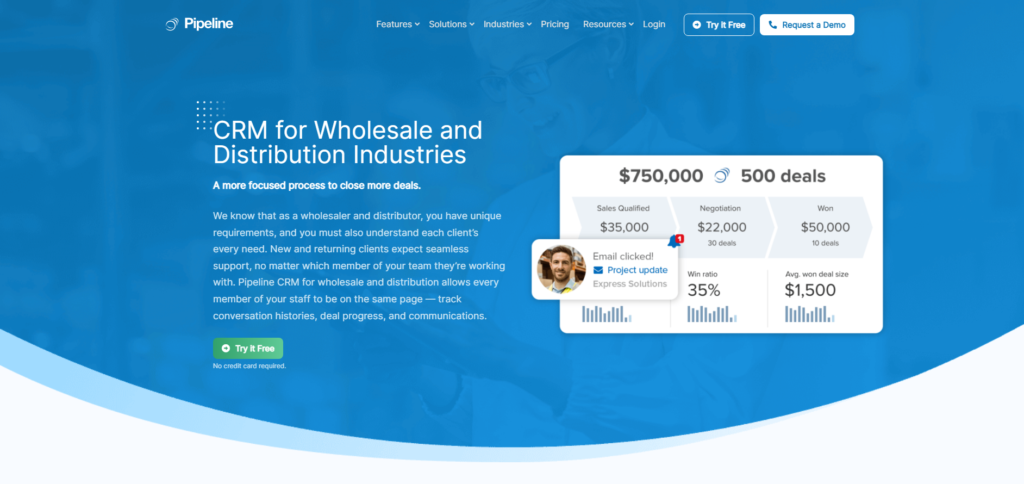
As a wholesaler and distributor, you must understand and accommodate your customers’ needs. Your customers (retailers) are under a significant amount of pressure to manage their customer’s needs and match their urgency.
Fortunately, Pipeline CRM for wholesale and distribution companies keeps every member of your staff on the same page with centralized communication — track conversation histories, deal progress, and communications. If your organization is focused on sales (i.e., attracting more retailer customers), then Pipeline is a great fit.
Features
Pipeline has all of the standard CRM features plus…
- Custom deal stages to suit the unique steps in your wholesaling business
- Commissions, payouts, and incentive tracking
- Track and manage your email campaigns automatically via your account
- Seamless integration with all of the tools you’re already using
- Automation to automate next steps, activities, reminders, updates, etc.
- A complete record of the relationship lifecycle
- Smart agendas that build themselves as your team works, so everyone knows what needs to be done for each person/deal
- SuperShare to send data to trusted contacts quickly and securely
- Open-source APIs to integrate with anything and everything you’re already using
- Native integration with tools like Zapier to customize integrations without developer or IT assistance
Pros/Cons
- Pipeline is scalable yet very affordable
- Extensive sales management automation
- Integrates with a large list of software (e.g., Microsoft, QuickBooks, Google Apps, Zapier, Paycove, CallRail, etc.)
- Best-in-class customer support
- No on-premise options
- Best for small-to-medium organizations
Reviews
- 4.4/5 star rating on G2 (904 reviews total)
- 4.4/5 star rating on Capterra (616 reviews total)
- 9.8/10 score via TrustRadius
- 4.2/5 star rating via Gartner (41 reviews total)
Pricing
- Start plan: $29 per user per month
- Develop plan: $39 per user per month
- Grow plan: $59 per user per month
Syspro CRM: Best CRM for distributors and manufacturers
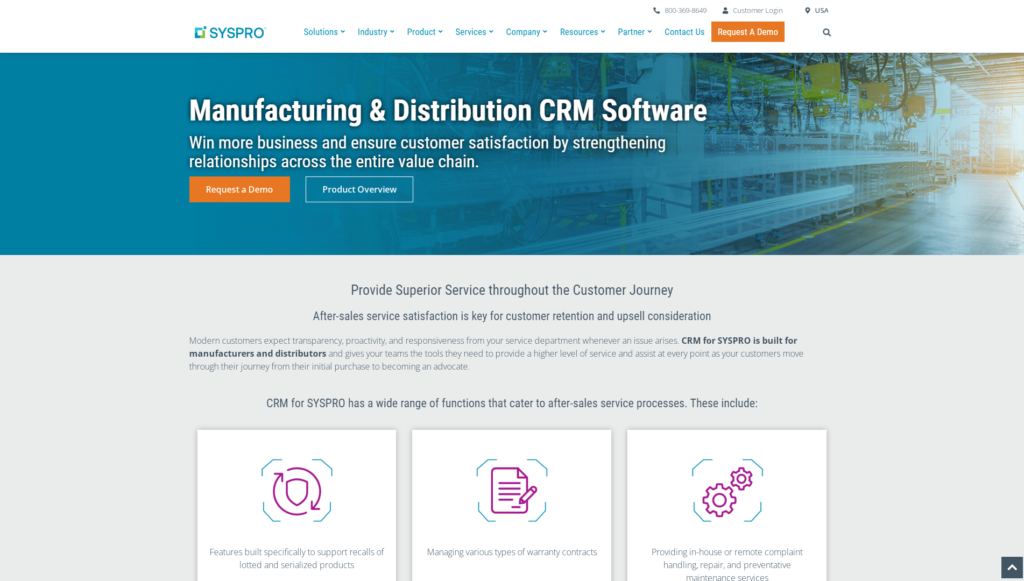
Syspro CRM is designed for manufacturers and their distributors.
Their CRM caters to manufacturing heavy industries – automotive, industrial machinery and equipment, food and beverage, fabrication, packaging, etc. They state that their product is “built for manufacturers and distributors who rely on loyal relationships up and down the supply chain, efficiency, and quality to be competitive.”
Features
Syspro has all of the standard CRM features, but it’s also …
- Built specifically to support recalls of lotted and serialized products
- Designed for various types of warranty contracts
- Created to provide in-house or remote complaint handling, repair, and preventative maintenance services
- Designed to manage customer service tasks, including custom automation case management
Pros/Cons
- Software is stable; multiple support options for bugs, errors, or issues
- Best-in-class support with rapid and consistent updates
- It can be overwhelming for small-to-medium size companies
- Navigation can be confusing; no links to other records
Reviews
- 4.1/5 star rating on G2 (200 reviews total)
- 4.2/5 star rating on Capterra (98 reviews total)
- 4.2/5 star rating via Gartner (41 reviews total)
- 8.9/10 score via TrustRadius
Pricing
- Call for a quote ($$$$)
Oracle NetSuite CRM is best for midsize, large, and global wholesalers
NetSuite has more than 32,000 customers in 215+ countries, so it makes sense that Gartner lists NetSuite as a leader in their Magic Quadrant. NetSuite is best for midsize, large, and global enterprises.
It is a comprehensive system that includes financials, HR, inventory management, professional services automation, CRM, and ERP.
Features
NetSuite has all of the standard CRM features plus…
- Sales force automation and pipeline management
- Strong customization capabilities and strong reporting features
- A customizable dashboard that provides A-Z views of all data points and areas of the business (e.g., leads, ops, customers, revenue, reports, etc.)
- Advanced customizations and ad hoc reporting
- A platform designed to work together (e.g., CRM, CX, HR, financials, etc.)
Pros/Cons
- All of your data across multiple departments (sales, CRM, HR, marketing, inventory management, etc.) in a single system
- A comprehensive system that works for a small organization but may be overkill
- Prohibitively expensive for many small-to-medium companies
- Not intuitive or easy to use. Requires lots of training, onboarding, and support
- Incredibly flexible, it can be customized in a variety of ways to meet user needs
- Significant investment of time for customization
- Additional fees for technical support
Reviews
- 4.0/5 star rating on G2 (2,305 reviews total)
- 4.1/5 star rating on Capterra (1,193 reviews total)
- 4.3/5 star rating via Gartner (159 reviews total)
- 7.8./10 score via TrustRadius
Pricing
- $129 – $999+ per mo. (paid annually)
- $$$$ for additional add-ons and modules
- $$$ for additional training
Odoo is the best CRM for wholesalers that prefer control via open-source software
Odoo is a platform, an ecosystem of open-source apps that are designed to work together.
Odoo bills itself as “the only platform you will ever need to help run your business: integrated apps kept simple and loved by millions of happy users.” It offers a suite of apps across various categories, including sales, marketing, website, finance, inventory and manufacturing, HR, services, and productivity.
However, Odoo’s greatest strength is also its greatest weakness.
They provide consistent updates, but the nature of open-source software means you’ll need to add any additional functionality you need. If your organization is looking for that, Odoo is a great fit.
Features
- Full ecosystem of apps, modules, and add-ons
- Fully integrated with other Odoo apps
- Open-source software provides organizations with full control
- Integrates with VoIP and email gateways for outgoing message control
- Odoo marketplace provides organizations with customized, ready-made apps
Pros/Cons
- Your first app with Odoo is always free, including hosting and support
- Subsequent apps are billed at an affordable rate
- Open-source software is barebones, requires a development team for specific customization
- Full integration with Odoo apps. Odoo doesn’t provide native integration with third-party software
Reviews
- 4.2/5 star rating on G2 (205 reviews total)
- 4.1/5 star rating on Capterra (573 reviews total)
- 4.2/5 star rating via Gartner (7 reviews total)
- 6.9/10 score via TrustRadius
Pricing
- The first app is free, with unlimited users
- All apps: $31.10 per user per month
- Custom: $46.80 per user per month
SAP Business ByDesign is the best CRM for generalist wholesale teams
SAP Business ByDesign is used in 144 countries across 12 languages. An end-to-end business suite for small-to-medium companies and subsidiary businesses, it covers finance, CRM, HR, project management, procurement, supply chain management, manufacturing, and wholesale distribution. A great distribution CRM software.
Features
- SAP Business ByDesign allows multiple companies in multiple countries with various sets of books to use the same system at the same time
- Provides real-time A-Z views of the manufacturing process
- Integrates with other SAP and non-SAP applications
- 12+ languages supported
Pros/Cons
- Embedded business analytics, mobility, e-learning, and support
- A comprehensive set of prepackaged integrations as well as SOAP and oData web services
- Easy integrations to other SAP or non-SAP applications
- Pricing includes hosting, unlimited storage, access to all application areas (see above), support, etc.
- Updates are delivered automatically four times a year with no IT staff required
- Customization is easy to do with no IT staff required
Reviews
- 4/5 star rating on G2 (182 reviews total)
- 4.2/5 star rating on Capterra (34 reviews total)
- 4.1/5 star rating via Gartner (7 reviews total)
- 7.9/10 score via TrustRadius
Pricing
- Self-Service User: $19 per user per month
- Core User: $103 per user per month
- Advanced User: $186 per user per month
- Base Package: $1,556 per user per month
What should wholesalers and distributors look for in a CRM?
It all depends on your needs.
Start by having a candid discussion about the following questions.
- Whose goals and objectives take priority? (e.g., executives, stakeholders, sales, etc.) If you want to increase sales, but executives want an analytical CRM, this will create conflict.
- Who will be the primary end-user of your CRM software? (it should be the same as above).
- What are their goals and objectives? These goals need to be congruent with the group above. If increasing sales and revenue is the primary goal, your sales team should be the primary end-user of your CRM.
- Which metrics and KPIs will be used to verify success? You don’t need a laundry list of metrics and KPIs to start. Start with the most important metrics, then work from there.
Here’s why this matters. CRM software comes in four varieties.
- Strategic: This is a macro, high-level view of CRM that caters to managers, directors, and executives. This type of CRM is implemented across several departments (IT, sales, marketing, support, service, etc.) focused on broad changes across the company as a whole.
- Operational: This is a meso-level view of CRM focusing on three specific areas — sales, marketing, and service/support. When we talk about CRM, we’re usually talking about operational CRM.
- Analytical: This type of CRM is designed for business analysts and data scientists; the primary focus is an investigation, whether that takes place at a macro, meso, or micro level. Analysts collect and present the data in a format that managers use to make decisions.
- Collaborative: This approach focuses on internal and external dialogue — wholesalers sharing data with manufacturers and retailers.
As a wholesaler, this is crucial.
If you’re going to invest the kind of money I’ve discussed above, you’ll want to make sure that you’re purchasing CRM software that will move you closer to your goals.
Wholesalers need the best CRM software
CRM software is an important component that keeps businesses together. Clarify your goals and objectives, then use them to choose the best CRM software for your wholesaling business.
For more information on Pipeline, try it free or book a demo! Our sales CRM experts would be happy to lend an ear and guide you on this process.

